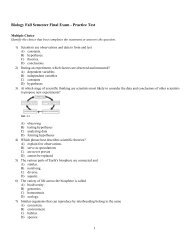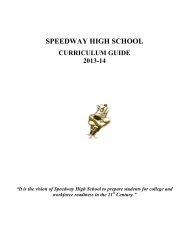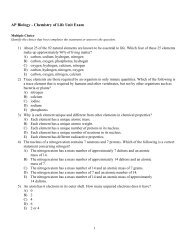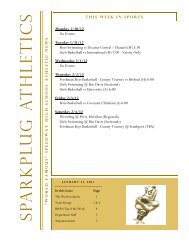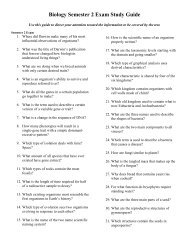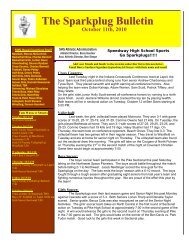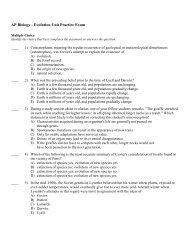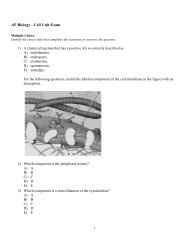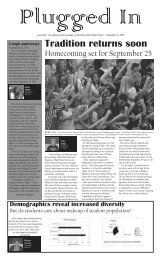ExamView - 2011-2012 AP Ecology Unit Exam.tst - AP Biology
ExamView - 2011-2012 AP Ecology Unit Exam.tst - AP Biology
ExamView - 2011-2012 AP Ecology Unit Exam.tst - AP Biology
You also want an ePaper? Increase the reach of your titles
YUMPU automatically turns print PDFs into web optimized ePapers that Google loves.
22) Which of the following groups would be most likely to exhibit uniform dispersion?<br />
A) moths, in a city at night<br />
B) dwarf mistletoes, which parasitize particular species of forest tree<br />
C) red squirrels, who actively defend territories<br />
D) lake trout, which seek out cold, deep water high in dissolved oxygen<br />
E) cattails, which grow primarily at edges of lakes and streams<br />
23) Which of the following is the best example of uniform distribution?<br />
A) a cultivated cornfield in the Midwest<br />
B) territorial songbirds in a mature forest during mating season<br />
C) bees collecting pollen in a wildflower meadow<br />
D) snails in an intertidal zone at low tide<br />
E) mushrooms growing on the floor of an old growth forest<br />
24) Which of the following causes populations to shift most quickly from an exponential to a logistic<br />
population growth?<br />
A) decreased death rate<br />
B) removal of predators<br />
C) increased birth rate<br />
D) competition for resources<br />
E) favorable climatic conditions<br />
The following questions refer to Figure 53.3, which depicts the age structure of three populations.<br />
25) Which population(s) is (are) in the process of decreasing?<br />
A) I<br />
B) II<br />
C) III<br />
D) I and II<br />
E) II and III<br />
26) A population's carrying capacity<br />
A) generally remains constant over time.<br />
B) can be accurately calculated using the logistic growth model.<br />
C) may change as environmental conditions change.<br />
D) increases as the per capita growth rate (r) decreases.<br />
E) can never be exceeded.<br />
5



